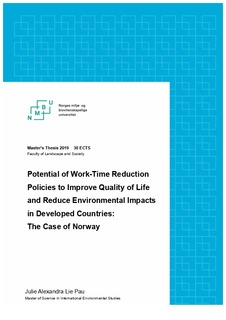| dc.contributor.advisor | Gómez-Baggethun, Erik | |
| dc.contributor.author | Pau, Julie Alexandra Lie | |
| dc.coverage.spatial | Norway | nb_NO |
| dc.date.accessioned | 2019-11-05T11:13:36Z | |
| dc.date.available | 2019-11-05T11:13:36Z | |
| dc.date.issued | 2019 | |
| dc.identifier.uri | http://hdl.handle.net/11250/2626581 | |
| dc.description.abstract | In the national and international policy agenda the societal challenges and dilemma of working time is a big matter of debate because it links to major sustainability challenges reflected in the Sustainable Development Goals (SDGs). This includes access to employment, work-life balance and the climate crises. Some politicians and economic leaders in Western industrialised countries state that we must work longer hours and more years in the future to maintain the welfare state and keep employment rate at the same levels as today in the context of an aging population. Others claim Work-Time Reductions (WTR) can be part of the solution to sustainability challenges, based on suggestive evidence of positive impacts on sustainability indicators like life satisfaction, work-life balance and reduced emissions. Hence, there is disagreement on how to best meet future societal challenges in terms of working time. The societal dilemma at stake is the choice between additional leisure time and additional purchase power, two objectives that may not be maximised simultaneously. The aim of this thesis is to advance our understanding of the feasibility of implementing WTR as a policy to improve quality of life and reduce environmental impact in developed countries. In pursuing this aim, semi-structured interviews with key informants has been conducted in Norway to assess the scope for advancing WTR policies in a developed country setting. The thesis also assesses the popularity of WTR policies amongst concerned stakeholders, and attempt to understand the broader socio-economic considerations and structural factors that need to be accounted for a successful implementation. Although there is limited support towards WTR policies at this point, this thesis suggests that implementation will be feasible if 1) there is broad understanding for potential aims and outcomes of the policies, 2) lower-paid workers are financially compensated, 3) affected employees are involved in the design of WTR policy, and 4) additional policies are implemented in order to ensure reduction of environmental impacts. | nb_NO |
| dc.language.iso | eng | nb_NO |
| dc.publisher | Norwegian University of Life Sciences, Ås | nb_NO |
| dc.rights | Attribution-NonCommercial-NoDerivatives 4.0 Internasjonal | * |
| dc.rights.uri | http://creativecommons.org/licenses/by-nc-nd/4.0/deed.no | * |
| dc.subject | Sustainability | nb_NO |
| dc.subject | Working time | nb_NO |
| dc.subject | Social sustainability | nb_NO |
| dc.subject | Economic sustainability | nb_NO |
| dc.subject | Environmental sustainability | nb_NO |
| dc.subject | Consumption | nb_NO |
| dc.subject | Production | nb_NO |
| dc.title | Potential of work-time reduction policies to improve quality of life and reduce environmental impacts in developed countries : the case of Norway | nb_NO |
| dc.type | Master thesis | nb_NO |
| dc.description.localcode | M-IES | nb_NO |

